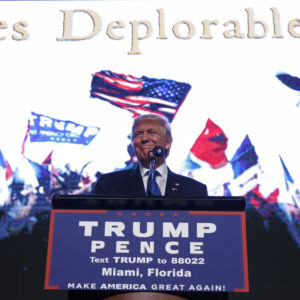When Mary Keohan arrived at Donald Trump’s rally Thursday night in Laconia, N.H., she immediately stood out from the crowd.
Decked out in Americana — hardly unusual at Trump events — she set herself apart with a note card, taped onto a simple hat. It read “Adorable Deplorable,” a reference to Hillary Clinton characterizing half of Trump’s supporters as a “basket of deplorables” earlier this month.
“I wanted to bring it to people’s attention,” said Keohan, an Independent voter from Gilford, N.H. “I don’t think people should be called baskets of anything.”
"Adorable deplorable." Mary Keohan says she's trying to make lemons into lemonade with Clinton's "insulting" comment pic.twitter.com/QBn3JY7alg
— Nicole Dungca (@ndungca) September 15, 2016
But Keohan is not alone in calling herself the “D-word.” Many supporters of the Republican presidential nominee are looking to “reclaim” the term as their own, highlighting his Democratic opponent’s controversial comment.
Speaking at a New York campaign fundraiser, Clinton told her audience, “To just be grossly generalistic, you could put half of Trump’s supporters into what I call the ‘basket of deplorables.’ Right? The racist, sexist, homophobic, xenophobic, Islamophobic — you name it.”
The Democrat later attempted to walk this back, saying she regretted using the word “half,” but linguistic experts are already observing Trump boosters deploying “deplorable” as “a self-describing badge of pride.”
“You can see why it would have that appeal,” said George Lakoff, a linguistics professor at the University of California Berkeley who has written extensively about political speech. “They’re saying it like they’re bad boys.”
It isn’t just supporters either. Trump himself is embracing the term with dramatic flair.

Republican presidential candidate Donald Trump smiles as he arrives to a campaign rally at the James L. Knight Center, Friday, Sept. 16, 2016, in Miami. (AP Photo/Evan Vucci)
The Republican took the stage in a Miami, Fla., Friday night to the song “Do You Hear the People Sing” from “Les Miserables.” The screen behind him looked like a promo for the movie musical, but with the title “Les Deplorables’ and French flags replaced by a Trump campaign flag and an American flag.
“Welcome to all of you deplorables,” the candidate told the crowd.
The campaign is even selling “I Am A Deplorable” t-shirts. Other people have taken a more creative approach to show their pride in the term, including: “Deplorable Me” shirts — a play on the children’s movie “Despicable Me” — coffee mugs on Etsy and, of course, hundreds of internet memes.

Shirts saying “I Am A Deplorable” are now on sale on the Donald Trump campaign website. Image Capture: DonaldJTrump.com
But Lakoff reiterated the dictionary definition of the word “deplore,” which is a verb meaning “to deeply regret.”
“It assumes that if you are deplorable, you can’t do better, that you are irredeemable,” he said.
Michael Silverstein, a professor of anthropology, linguistics, and psychology at the University of Chicago, agreed with Lakoff and also pointed to other historical instances when various groups have reappropriated negative names about them to mean something positive.
“It has in recent times been just the very targets of [Trump supporters] bigotry who have turned [former] slurs by outsiders into insider words of identitarian pride,” he said.
For example, the use of the word “queer” went through different uses. It’s believed to have entered the English language in the 16th century, meaning “odd” or “peculiar.” By the early 20th century, term was starting to gain a derogatory connotation of sexual behavior, referring to men who would engage in same-sex relationships.
By the 1980s, the label queer began to be reclaimed from its negative use to a positive self-identified by LGBT people. It’s still a term debated today within their community.
As strange as it might seem, a similar reclamation of the word “deplorable is happening within the Trump community, Silverstein argues.
“The move is ‘back at you, bub! We’re proud of who/what we are,’” he said.
However, Jennifer Sclafani, a professor of linguistics at Georgetown University, is not convinced.
“It is difficult to compare the idea of Trump supporters reclaiming the word ‘deplorable’ as a noun to the previous examples of word reclamation,” she said. “First, the word deplorable does not have a history…[of] target[ing] a specific group of systematically subordinated people.”
Although, some within the Trump camp could make the claim that their “movement” is subjected to harsh treatment from Democrats and the liberal media.
“Even if one were to make the argument that Trump supporters as a whole have been subject to systemic prejudice, there is still no history of use of ‘deplorable’ as a targeted epithet to make reclamation possible,” Sclafani said. “It seems to me that the only reason the word has created so much news is because it was one of the very few instances in which Hillary Clinton used colorfully negative language, a habit that people normally associate with Donald Trump.”

